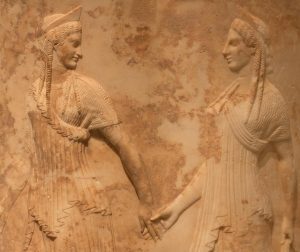Our first poetry news round-up of the week looks at the winner of the Roger Kowalski Award and the Papyrus linked to Sappho.
2021 Roger Kowalski Award Winner Announced
 One of the most prominent Moroccan Francophone poets has been named as the winner of this year’s Roger Kowalski Awards for Poetry. Abdellatif Laabi has won the award for “Presque riens”, his latest book, which was released in October 2020.
One of the most prominent Moroccan Francophone poets has been named as the winner of this year’s Roger Kowalski Awards for Poetry. Abdellatif Laabi has won the award for “Presque riens”, his latest book, which was released in October 2020.
The book looks at a range of different existential questions that surround life.
The award is named after Roger Kowalski, a famous native poet from Lyon in France. It is an annual award that is given to a living poet who is a Francophone and who has connections to the city of Lyon. Laabi is the first Moroccan to win the prize and he is connected to the city via his wife who is a Lyon native.
Laabi was born in 1942 in Fez. He is not only well known for his writing his own poetry but also his translations of classic Arabic poems into French. He attended the Mohammed VI University in Rabat where he studied French literature, and he then went on to become a professor of French Language teaching in the Moroccan capital.
Together with fellow writers Mostafa Nissaboury and Mohammed Khair-Eddine, he established the first-ever Moroccan francophone magazine of poetry in 1966.
During the “Years of Lead” period in the country, he was arrested and spent 10 years in prison. He was released in 1980 and 5 years later moved to France. He has written 20 books of poetry, 5 novels and translated several works from Arabic.
Origins of Papyrus Questioned
 The Museum of the Bible which is located in Washington made an announcement recently that it was sending back to Egypt 5000 fragments of ancient papyrus. Amongst these was a piece of ancient poetry that they had acquired in 2012 which was written by Sappho, the ancient Greek poet.
The Museum of the Bible which is located in Washington made an announcement recently that it was sending back to Egypt 5000 fragments of ancient papyrus. Amongst these was a piece of ancient poetry that they had acquired in 2012 which was written by Sappho, the ancient Greek poet.
For many years, the origin of the fragments has been disputed, and the discovery of the poetry only came to light in 2014.
Sappho of Lesbos is one of the earlier known Greek lyric poets. And it is not just her poetry but also her subject matter, the expression of female same-sex interest, that has made her something of an icon.
Relatively little of her poetry has survived over the years, except for some fragments. This most recent discovery contains the last five stanzas of one poem and the parts of a second poem – this makes it one of the longest pieces of continuous verse by the poet that exists.
Whilst this discovery has made headlines all over the world, there are some questions being asked about the origins of the papyrus and, of course, its Provenance. Given the laws that were passed in Egypt in 1983 regarding the trade of antiquities, and the fact that as part of those guidelines no artefacts that left Egypt prior to 1970 or illegally should be authenticated, the find raises ethical and legal questions as well.
Where the papyrus in question is now, and exactly who owns it is not clear.


You must register to comment. Log in or Register.